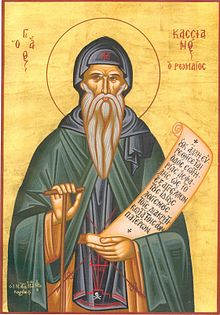John Cassian
| Saint John Cassian | |
|---|---|

Saint John Cassian
|
|
| Born | c. 360 Scythia Minor (modern-day Dobrogea, Romania) |
| Died | c. 435 Massilia, Gaul (modern-day Marseilles, France) |
| Venerated in | Eastern Orthodox Church, Roman Catholic Church, Anglican Communion, Eastern Catholic Churches |
| Major shrine | Monastery of St Victor, Marseille |
| Feast | East:February 29th (28th non-leap years), Episcopal Church (USA); West:July 23 |
Saint John Cassian (c. 360 – 435 AD), John the Ascetic, or John Cassian the Roman (Latin: Joannes Eremita Cassianus, Joannus Cassianus, or Joannes Massiliensis), was a Christian monk and theologian celebrated in both the Western and Eastern Churches for his mystical writings. Cassian is noted for his role in bringing the ideas and practices of Christian monasticism to the early medieval West.
Cassian was born around 360, most likely in the region of Scythia Minor (now Dobruja, a historical region shared today by Romania and Bulgaria), although some scholars assume a Gallic origin. The son of wealthy parents, he received a good education: his writings show the influence of Cicero and Persius. He was bilingual in Latin and Greek.
Cassian mentions having a sister in his first work, the Institutes, with whom he corresponded in his monastic life; she may have ended up with him in Marseilles.
As a young adult he traveled to Palestine with an older friend Germanus, with whom he would spend much of the next twenty-five years. There they entered a hermitage near Bethlehem. After remaining in that community for about three years, they journeyed to the desert of Scete in Egypt, which was rent by Christian struggles. There they visited a number of monastic foundations.
Approximately fifteen years later, about 399, Cassian and Germanus faced the Anthropomorphic controversy provoked in letter form by Theophilus, Archbishop of Alexandria. Cassian noted that the majority of the monks received the message of their patriarch "with bitterness," and charged Theophilus with heresy for impugning the plain teaching of the Holy Scripture. Following an unsuccessful journey to Alexandria to protest the matter, Cassian and Germanus fled with about 300 other Origenist monks. Cassian and Germanus went to Constantinople, where they appealed to the Patriarch of Constantinople, Saint John Chrysostom, for protection. Cassian was ordained a deacon and was made a member of the clergy attached to the Patriarch while the struggles with the imperial family ensued. When the Patriarch was forced into exile from Constantinople in 404, the Latin-speaking Cassian was sent to Rome to plead his cause before Pope Innocent I.
...
Wikipedia
